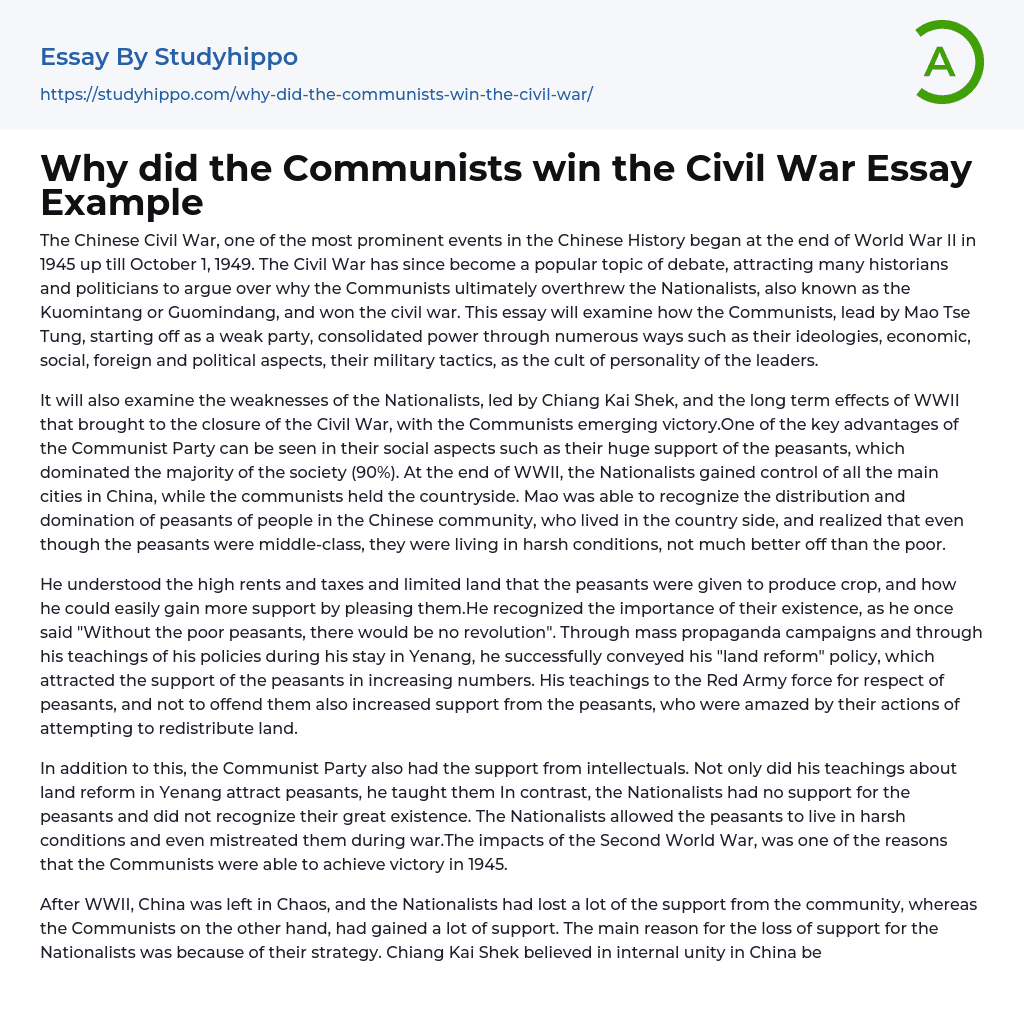The Chinese Civil War, one of the most prominent events in the Chinese History began at the end of World War II in 1945 up till October 1, 1949. The Civil War has since become a popular topic of debate, attracting many historians and politicians to argue over why the Communists ultimately overthrew the Nationalists, also known as the Kuomintang or Guomindang, and won the civil war. This essay will examine how the Communists, lead by Mao Tse Tung, starting off as a weak party, consolidated power through numerous ways such as their ideologies, economic, social, foreign and political aspects, their military tactics, as the cult of personality of the leaders.
It will also examine the weaknesses of the Nationalists, led by Chiang Kai Shek, and the long term effects of WWII that brought to the closure o
...f the Civil War, with the Communists emerging victory.One of the key advantages of the Communist Party can be seen in their social aspects such as their huge support of the peasants, which dominated the majority of the society (90%). At the end of WWII, the Nationalists gained control of all the main cities in China, while the communists held the countryside. Mao was able to recognize the distribution and domination of peasants of people in the Chinese community, who lived in the country side, and realized that even though the peasants were middle-class, they were living in harsh conditions, not much better off than the poor.
He understood the high rents and taxes and limited land that the peasants were given to produce crop, and how he could easily gain more support by pleasing them.He recognized th
importance of their existence, as he once said "Without the poor peasants, there would be no revolution". Through mass propaganda campaigns and through his teachings of his policies during his stay in Yenang, he successfully conveyed his "land reform" policy, which attracted the support of the peasants in increasing numbers. His teachings to the Red Army force for respect of peasants, and not to offend them also increased support from the peasants, who were amazed by their actions of attempting to redistribute land.
In addition to this, the Communist Party also had the support from intellectuals. Not only did his teachings about land reform in Yenang attract peasants, he taught them In contrast, the Nationalists had no support for the peasants and did not recognize their great existence. The Nationalists allowed the peasants to live in harsh conditions and even mistreated them during war.The impacts of the Second World War, was one of the reasons that the Communists were able to achieve victory in 1945.
After WWII, China was left in Chaos, and the Nationalists had lost a lot of the support from the community, whereas the Communists on the other hand, had gained a lot of support. The main reason for the loss of support for the Nationalists was because of their strategy. Chiang Kai Shek believed in internal unity in China before proceeding onto defeating the external danger-the Japanese, "The Japanese are a disease of the skin, the communists are a disease of the heart". Their pre-occupation with anti-Communist extermination campaigns caused discontent amongst the Chinese, because of the mess that the Japanese were creating in China.The Communists, conversely, had a policy of
driving out the Japanese, in the belief that the Japanese were "foreign devils" with an official slogan "kill all, destroy all, burn all" and should be removed from the country, and this gained a lot of support from the Chinese because the Japanese were creating lots of chaos and havoc in China. The utmost result was that the Communist's fighting force, known as the "Red Army" were seen to be brave, full of determination, winning increasing support.
This was a very important factor as it affected the Chinese community's attitude towards the two parties. The Red Army was also able to gain experience from the battle with the Japanese, increasing their military skills.
- Bangladesh essays
- China essays
- Hong Kong essays
- India essays
- Japan essays
- Kuala Lumpur essays
- Malaysia essays
- Manila essays
- Pakistan essays
- Philippines essays
- Singapore essays
- Vietnam essays
- Vietnamese essays
- Abolitionism essays
- Adam Smith essays
- American History essays
- American Revolution essays
- Ancient Egypt essays
- Articles Of Confederation essays
- Atlantic Slave Trade essays
- Aztec essays
- Benjamin Franklin essays
- Civil Rights Act of 1964 essays
- Civil Rights Movement essays
- Civil war essays
- Cleopatra essays
- French And Indian War essays
- Gettysburg essays
- Great Depression essays
- Hurricane Katrina essays
- Industrial Revolution essays
- Jamestown essays
- Manifest Destiny essays
- Mccarthyism essays
- Patrick Henry essays
- Pearl Harbor essays
- Pocahontas essays
- Prohibition essays
- Pyramids essays
- Salem Witch Trials essays
- Slavery essays
- The New Deal essays
- Thirteen Colonies essays
- Westward Expansion essays
- Activism essays
- Communism essays
- Conservatism essays
- Liberalism essays
- Marxism essays
- Nationalism essays




